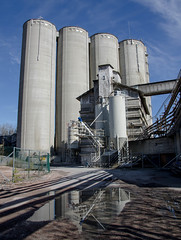As much as I preach cross-collaboration, I am guilty of "silo thinking."
"Silo" is a concept developed in 1988 by Phil Ensor and documented in this essay. Essentially, a siloed organization is one where each process is managed in a top-down way with very little interaction with other functions. It's bad for an organization because there is very little cross-collaboration and it's bad for employees because they feel stuck in top-down relationships with management.
This top-down way of accomplishing things is referred to as "siloed" because the process looks, well, like a silo.
I think that to some extent, there is no getting around having silos in a library. Each department in a library has its own set of priorities and its own way of accomplishing those goals. Cataloging has to get books onto the shelves, real or virtual, and must have a process for accomplishing that task. Reference has to help users find resources and must have a process for identifying what users need.
But I also think that there are functions that are larger than any one department. And that's where "silo thinking" doesn't work Responsibility for those cross-departmental functions may rest upon a single person and that person may reside in a department. But what really makes these bigger-than-me functions succeed is when we agree to bust out of this way of thinking and really work together.
I was faced with my own "siloed thinking" recently when someone suggested that ALCTS, the American Library Association's technical services division, should be involved in Open Access Week. It was a cool idea, sure, but I didn't immediately see the connection between technical services and open access. But upon further examination, I recognized my own "silo thinking" at work. Open access is one of those bigger-than-me functions that requires buy-in and effort from every part of the library. Yes, the Scholarly Communications Librarian may be situated in Reference. But in order to make a push at your library to make open access work, you need Acquisitions to be on board with adding OA publications to your Knowledge Base. And you have to have Digital Projects on board with supporting the institutional repository.
Where do you get stuck in "siloed thinking" and what can you do to bust out of it? Drop me a line in the comments!
Stay positive,
Erin

No comments:
Post a Comment